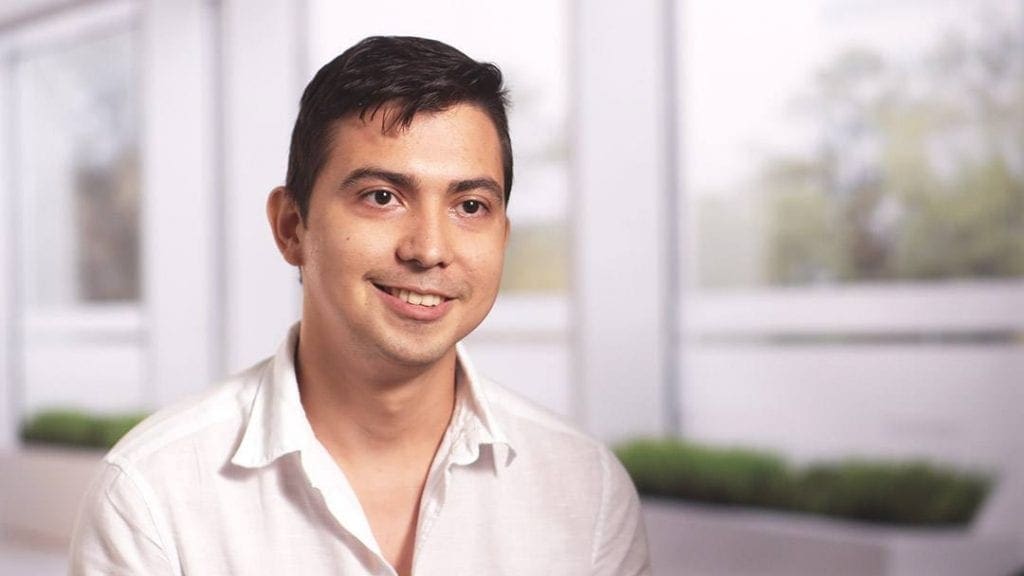‘Fast and very precise’ robotics-guided biopsy offers precision in diagnosis for international patient

Over five years, Erasmo Carlos Perdomo Maradiaga received six different diagnoses from doctors in Honduras. The 26-year-old father needed answers, and despite the COVID-19 pandemic, he realized a trip to the U.S. could be his only hope for a precise diagnosis.
Excruciating back pain first brought Erasmo Carlos Perdomo Maradiaga to the doctor. Imaging tests identified a mass on his spine. Physicians in his native Honduras thought he might have tuberculosis, but a biopsy confirmed it was a tumor.
Erasmo was diagnosed with non-Hodgkin lymphoma and began chemotherapy.
Although he achieved remission at one point, the cancer recurred several times over the next five years. During that time, Erasmo endured three biopsies and received six different diagnoses, as there are more than 60 subtypes of non-Hodgkin’s lymphoma.
“It was very difficult for my doctors in Honduras to reach a final diagnosis, and that made it difficult to plan treatment,” says Erasmo, a health care administrator and father of a young daughter. “The doctors said they didn’t have the technology to do the biopsy work and also the pathology work. They asked me to look to the United States.”
Erasmo turned to Mayo Clinic’s international representative office in Honduras. The team there got to work creating an itinerary with Spanish-speaking experts at Mayo Clinic. Despite the travel challenges created by the COVID-19 pandemic, Erasmo arrived at Mayo Clinic in Florida in late August in hopes of a precise diagnosis.
On Aug. 31, he underwent an awake robotic-guided spine biopsy under the steady hands of Mayo Clinic neurosurgeons Selby Chen, M.D., and Alfredo Quinones-Hinojosa, M.D.
The minimally invasive procedure was the first such procedure performed at Mayo Clinic.
“I waited for this moment a very long time. It’s a relief for me and my family, and for my doctors in Honduras, to know that they can rely on the results to plan the best treatment for me.”
Erasmo Carlos Perdomo Maradiaga
“When I talked to my family and my doctors, and I told them I was going through surgery awake and assisted by a robot, they were very surprised because they didn’t know this technology was here,” Erasmo says.
The experience, though a milestone for Mayo Clinic, was largely uneventful.
“I remember the doctors and nurses talking to me, asking if I was fine. But it was fast and very precise,” Erasmo says.
Another difference was that following the procedure, Erasmo was discharged to a hotel on campus, part of Mayo’s new advanced care at home program, which is part of the Mayo Clinic Platform and allows select patients who would normally recover in the hospital to finish recuperating as an outpatient. And before the week was up, Erasmo had an accurate diagnosis ― B lymphoblastic leukemia/lymphoma ― and a care plan.
During his time at Mayo Clinic in Florida, Erasmo was supported by Mayo Clinic International Services, which coordinated his care and expedited appointments with other specialists, including Ernesto Ayala, M.D., a Mayo Clinic oncologist. In hopes of further guiding his treatment, Erasmo also underwent a bone marrow biopsy during his time in Florida.
“I waited for this moment a very long time,” Erasmo says. “It’s a relief for me and my family, and for my doctors in Honduras, to know that they can rely on the results to plan the best treatment for me.”
As of December, after completing more targeted therapy, Erasmo says he is showing signs of remission.
Watch: Awake robotic spine biopsy brings patient accurate diagnosis
